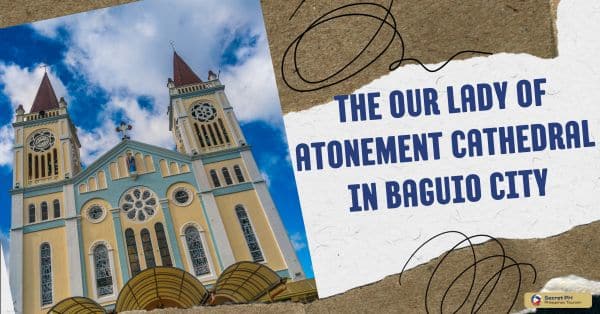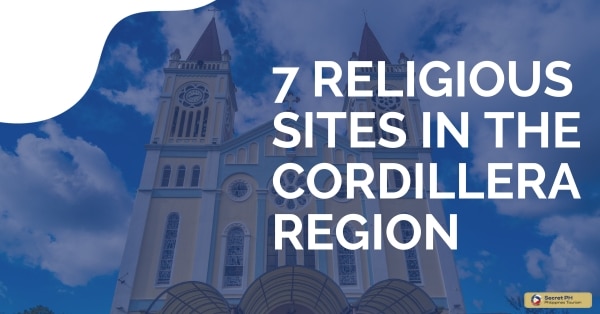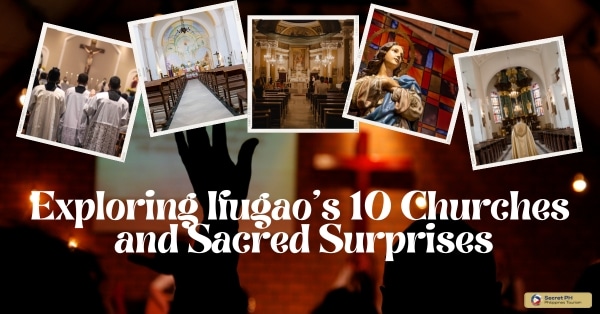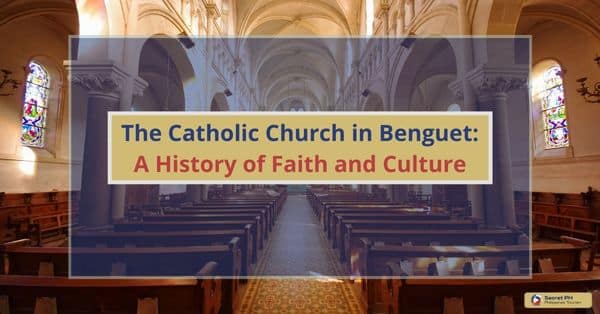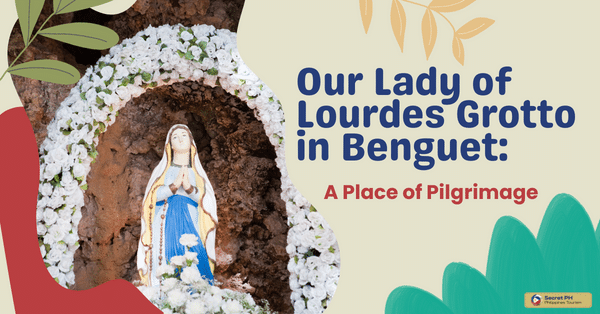Religion is crucial in shaping the values and traditions of Filipino families, with Catholicism as the dominant faith. Religious practices, such as attending Mass and observing religious holidays, reinforce family ties and provide a sense of community. However, modernization and globalization are challenging the traditional role of religion in family life.
In this blog post, we’ll explore the role of religion in Filipino families. Discuss different religious traditions and beliefs that shape family life, and look at how religion has changed over time. As well as the challenges and changes that religion brings to Filipino family life. Join us as we explore the importance of religion in Filipino family life and culture!
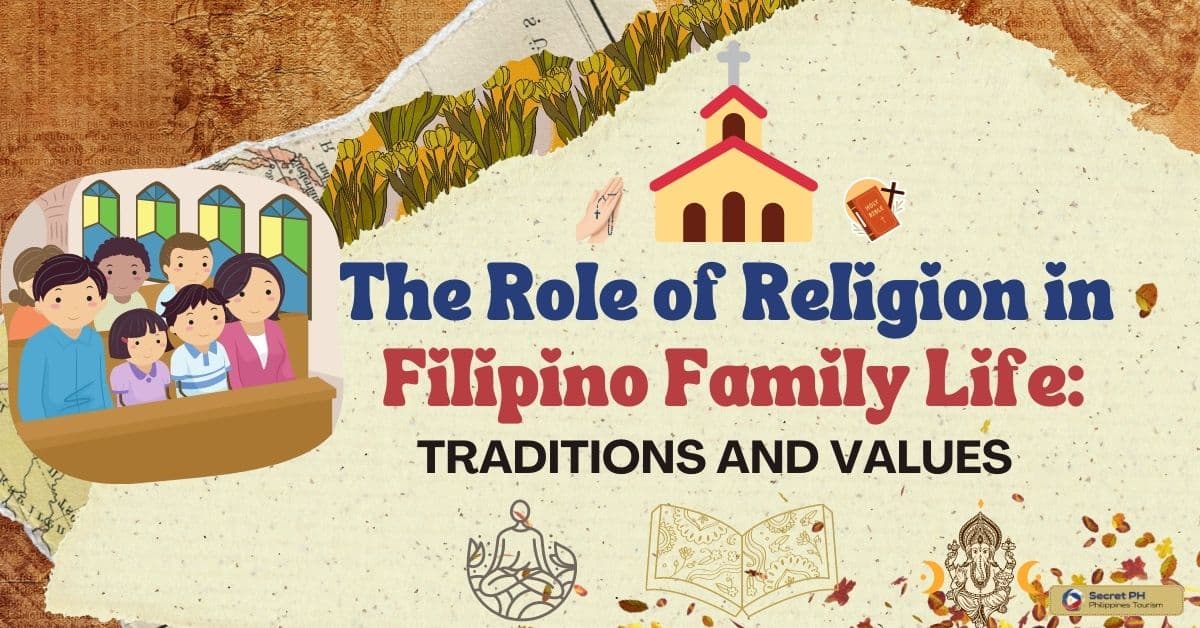
Religious Traditions in Filipino Culture
Religious traditions are deeply ingrained in Filipino culture, with Catholicism as the dominant faith. Catholicism in the Philippines was introduced by Spanish colonizers in the 16th century and has since become an integral part of the country’s history and social norms. Filipinos observe religious practices such as attending Mass, confessing sins, and participating in religious processions.
Aside from Catholicism, other religious groups also have a significant presence in the Philippines. Protestant Christians, Muslims, and Buddhists have their own unique traditions and practices that are celebrated and observed by their respective communities. Religious festivals and celebrations are an essential part of Filipino culture and bring people together to express their religious devotion and cultural heritage.
The use of religious symbols and practices is also pervasive in daily life in the Philippines. Including the use of religious icons and statues in homes and businesses, as well as the practice of saying prayers before meals and at bedtime. Overall, religion plays a vital role in shaping the cultural identity of the Philippines and its people.
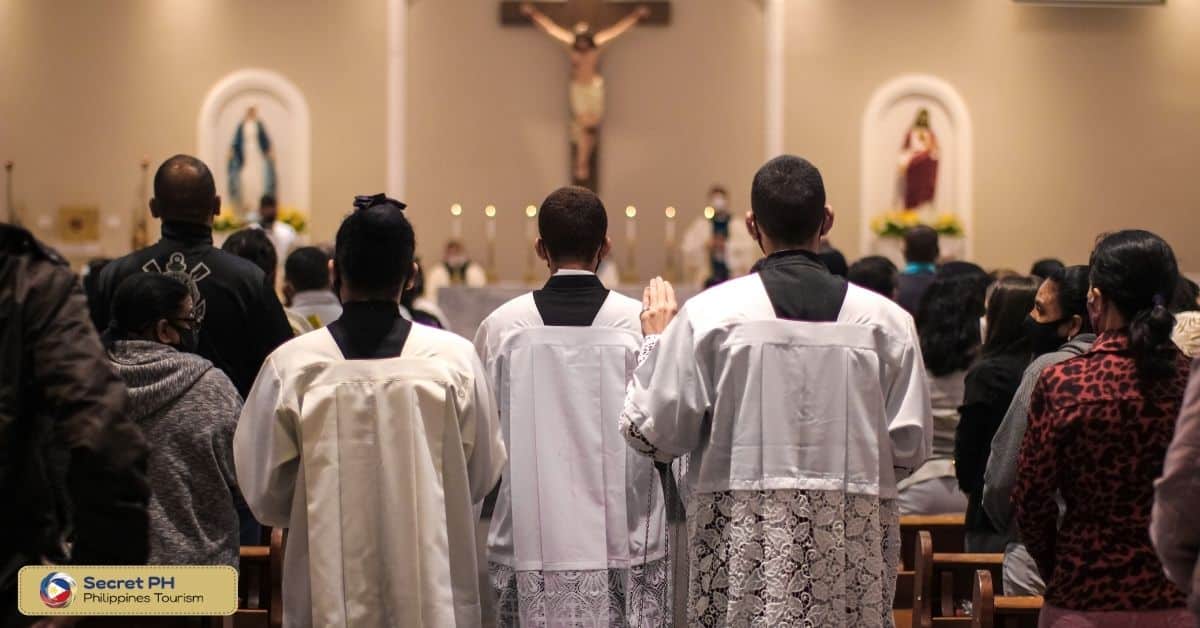
The Role of Religion in Shaping Filipino Family Values
Religion is a significant influence in shaping the values and traditions of Filipino families. Catholicism is the dominant religion in the Philippines, and its teachings have played a significant role in family dynamics. Other religious beliefs and practices also contribute to the development of family values in the country. Here are some ways in which religion shapes Filipino family values:
Here are some of the ways that religion has influenced Filipino family values:
- Emphasis on respect for elders – In Filipino culture, respect for elders is highly valued, and this is greatly influenced by the teachings of religion. The Bible, for example, teaches children to honor and obey their parents, and this has been passed down through generations.
- Importance of family unity – Religion also plays a vital role in promoting the unity and solidarity of families. Catholic teachings emphasize the importance of family and communal life, which has greatly influenced Filipino family values.
- Focus on morality and ethics – Religion places a high emphasis on morality and ethics, and these values have been instilled in Filipino families. Honesty, humility, and kindness are just some of the values that are highly valued in Filipino culture.
- Celebration of special occasions – Religion plays a significant role in celebrating special occasions such as weddings, baptisms, and fiestas. These events help to bring families together and strengthen family ties.
- Sense of community – Religion has also fostered a strong sense of community in the Philippines. Filipino families often participate in religious events and celebrations with their local community, creating a shared sense of faith and belonging.
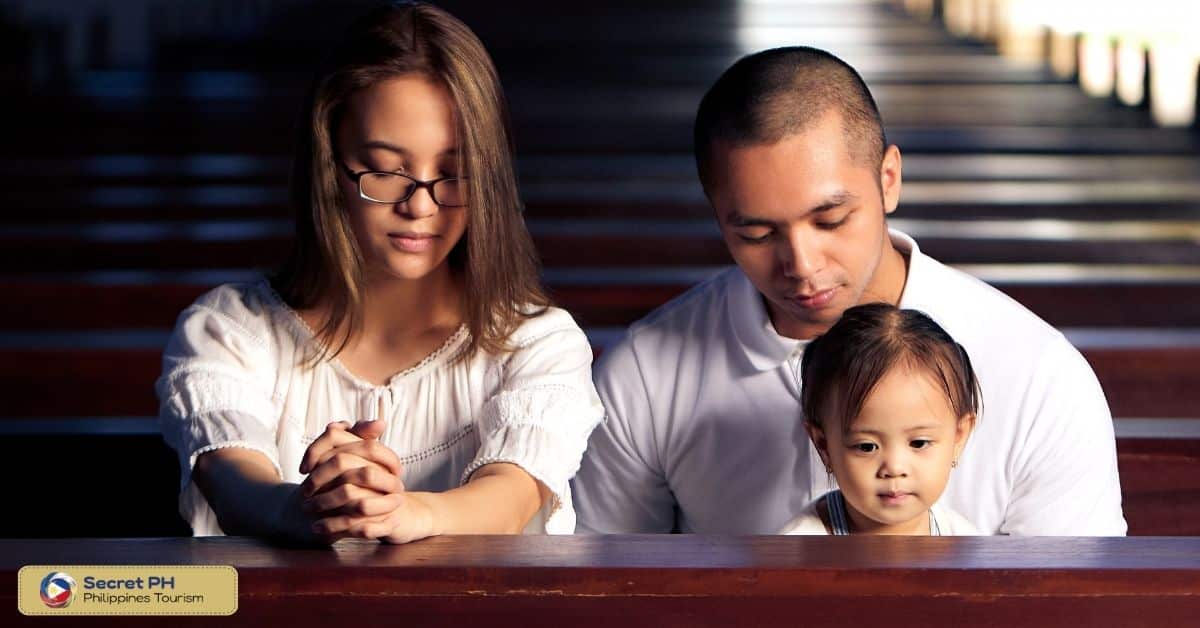
Family Celebrations and Religious Observances
Religion plays a significant role in shaping the traditions and values of Filipino families. Family celebrations and religious observances are essential aspects of Filipino culture, and they provide opportunities for families to come together and reinforce their bonds. Here, we will explore the significance of family celebrations and religious observances in the context of Filipino family life.
Here are some of the most significant religious celebrations and observances in the Philippines:
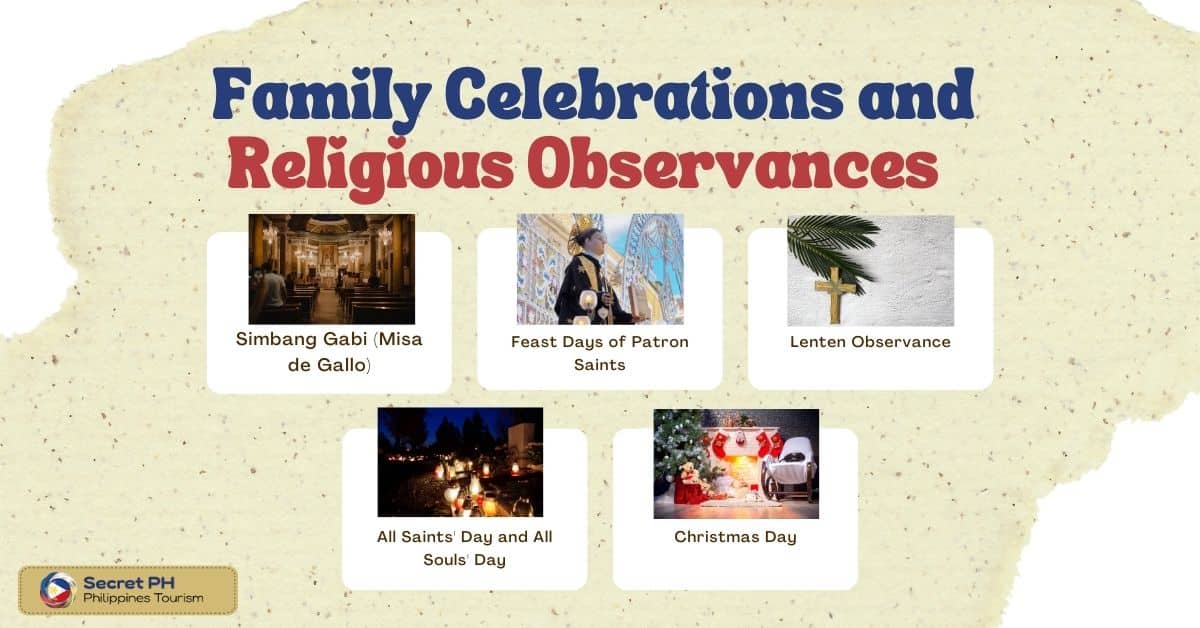
Simbang Gabi (Misa de Gallo)
Simbang Gabi is a nine-day novena that culminates with the Christmas Eve midnight mass, popularly known as Misa de Gallo. The tradition of Simbang Gabi dates back to the Spanish colonial era, and it remains a significant religious observance in the Philippines. During Simbang Gabi, families wake up early (around 3-4 AM) to attend the daily nine-day mass, and then share breakfast together afterward.
Feast Days of Patron Saints
The Philippines has a long history of patronage of various saints, particularly among Catholic communities. Every town and city has its own patron saint, and the feast day of that particular saint is celebrated with much fanfare, including parades, processions, and street parties. Families typically attend mass as a group and partake in the festivities that ensue.
Lenten Observance
Lent is the most significant religious observance for Catholics around the world, and the Philippines is no exception. The Holy Week is particularly significant for Filipinos, and it includes Palm Sunday, Maundy Thursday, Good Friday, and Black Saturday. Many families participate in processions and attend various religious services during this time.
All Saints’ Day and All Souls’ Day
All Saints’ Day and All Souls’ Day are observed on November 1st and 2nd, respectively. These days are dedicated to remembering and honoring the departed loved ones, and families visit and clean the tombs of the departed ones. It is a time of prayer and reflection, and families often hold gatherings and offer meals to visitors.
Christmas Day
Christmas is the most significant celebration in the Philippines, and it is observed with much fervor and devotion. The Filipino Christmas celebration is known for being one of the longest, starting as early as September and ending in early January. Families come together to attend the midnight mass on Christmas Eve, sharing Noche Buena (a festive meal) afterward.

Filipino Family Life and the Catholic Church
Filipino family life and the Catholic Church are closely intertwined, with Catholicism being the dominant religion in the Philippines. The Church’s teachings on family values, such as the importance of marriage, respect for elders, and the sanctity of life, have strongly influenced Filipino family dynamics.
The Catholic Church in the Philippines is also deeply involved in the daily lives of Filipino families. From baptism to marriage to funerals, the Church plays a central role in many significant family milestones.
Catholic schools and universities provide education to millions of Filipino students, and Catholic charities and organizations provide vital social services to communities throughout the country. The Catholic Church’s influence on Filipino family life is widespread and enduring.
Other Religious Beliefs and Their Influence on Filipino Families
Religion has always been an integral part of Filipino culture and society, shaping the values, behaviors, and attitudes of the Filipino people. While Roman Catholicism remains the dominant religion in the Philippines, other religious beliefs have also made significant contributions to the country’s rich and diverse religious landscape.
Here, we’ll explore how other religious beliefs have influenced Filipino families and their way of life.
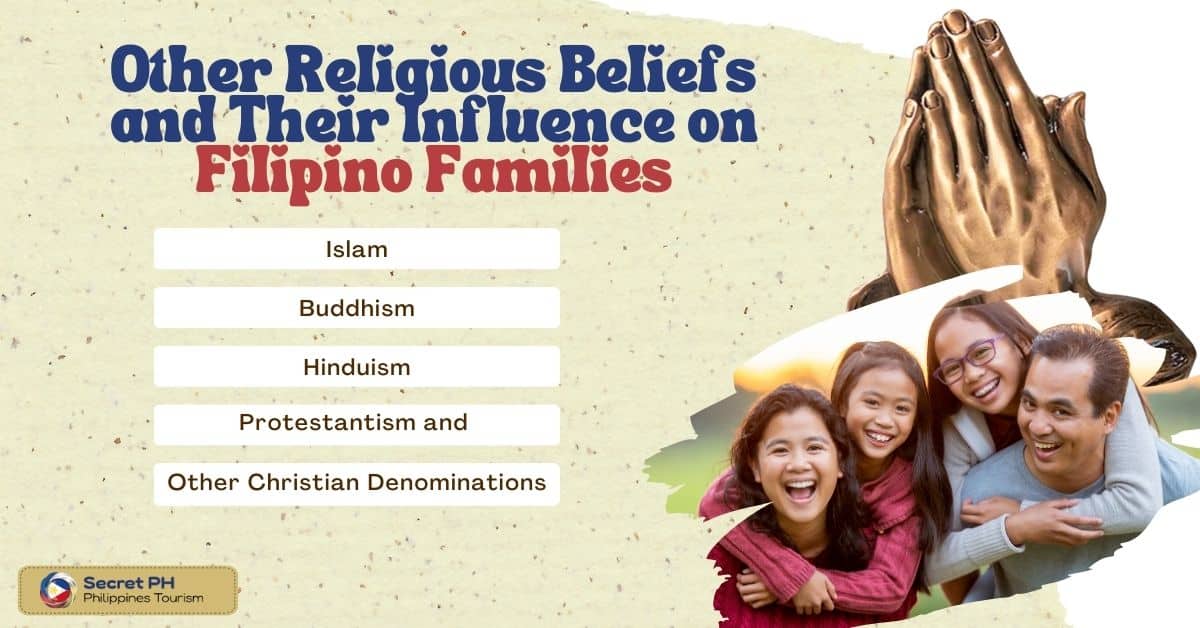
Islam
Islam in the Philippines is the second-largest religion representing a significant population of Filipino Muslims in Mindanao and other parts of the country. Islamic beliefs and practices have shaped the culture and traditions of Filipino Muslim families, emphasizing the importance of community, hospitality, and respect for elders.
Family ties are highly valued in Islam, and family members often live within close proximity to one another. Islamic teachings also stress the importance of sharing wealth, especially with the less fortunate members of society.
Buddhism
Buddhism is not as prevalent in the Philippines as Islam, but its influence can still be felt among Filipino families who practice the religion. Filipino Buddhists follow the teachings of Buddha, which emphasize the importance of compassion, mindfulness, and detachment from material possessions.
Buddhist families in the Philippines value harmony and balance, striving to maintain peaceful and stable relationships within their households. They also have a strong sense of respect for nature and the environment.
Hinduism
While Hinduism is not widely practiced in the Philippines, its impact on Filipino family life can still be observed in the beliefs and practices of some Filipinos. Hinduism promotes the idea of karma, or the consequences of one’s actions, which influences how some Filipino families view their place in the world.
They believe that their actions have consequences. Both in this life and the next and strive to live a life of moral uprightness and spiritual purity. Hindu families also place a strong emphasis on education, recognizing its importance in achieving success and fulfilling one’s purpose in life.
Protestantism and Other Christian Denominations
Apart from Roman Catholicism, there are various Protestant denominations and other Christian beliefs represented in the Philippines. Bringing with them their own set of values and practices. Protestant and evangelical Christian families often stress the importance of individual spirituality and personal relationships with God.
They also emphasize the importance of spreading the gospel and evangelizing to others. Christian families in the Philippines of various denominations often hold regular church services and participate in religious festivals and events.
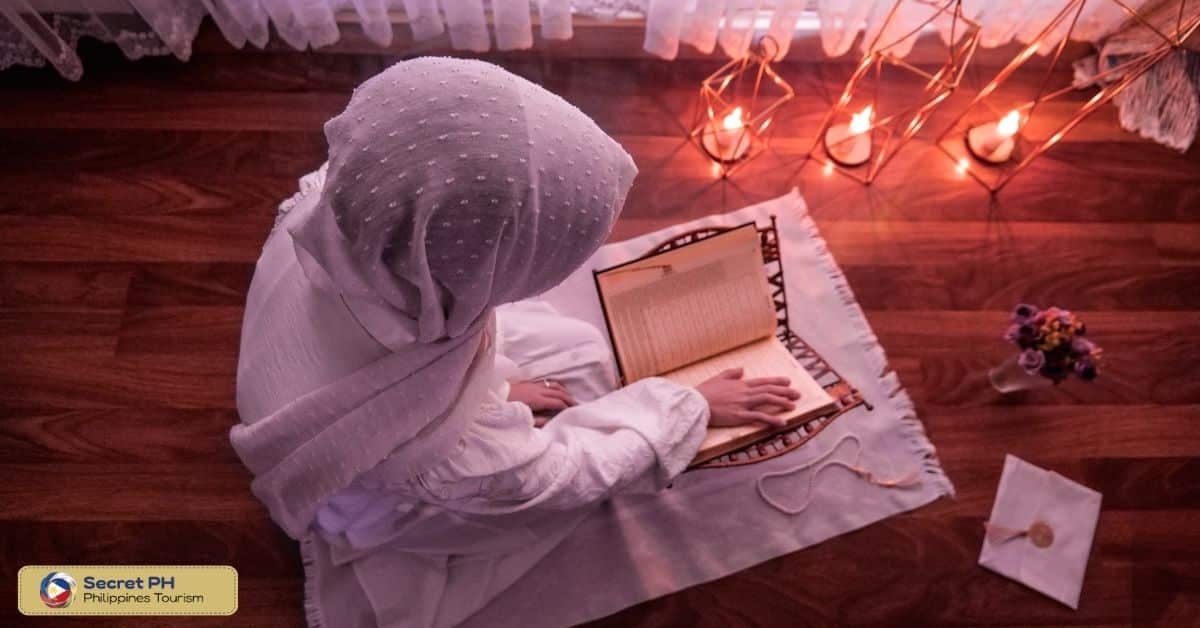
Challenges and Changes in the Role of Religion in Filipino Family Life
Religion plays an influential role in the lives of many Filipinos. It has been the center of their culture, and numerous households have integrated religious practices into their daily routines. However, with the continuous emergence of modernization and globalization, there have been challenges and changes in the role of religion in Filipino family life.
Here is a table outlining some of the challenges and changes in the role of religion in Filipino family life:
| Challenges | Changes |
|---|---|
| Increasing Secularization | Easing of Stricter Religious Practices |
| Socioeconomic Changes | Changes in Marital and Family Values |
| Generational Differences | Increased Diversity of Religious Expression |
| The Emergence of New Religious Movements | Greater Emphasis on Personal Spirituality |
The challenges to the role of religion in Filipino family life are multifaceted. With the increasing secularization of society, many families are faced with the challenge of maintaining their religious practices, particularly in urban areas where modernization is prevalent. Additionally, socioeconomic changes have also contributed to the transformation of family values, leading to a shift in the importance of organized religion.
However, there have also been notable changes in the way religion is practiced in Filipino families. The easing of stricter religious practices has enabled more Filipinos to express their faith in ways that are more meaningful to them personally. There have also been changes in marital and family values, with more emphasis on gender equality and the importance of strong family bonds.

In conclusion
Religion has been a major influence in Filipino family life for centuries. From Catholicism to Islam and Buddhism, different religions have shaped the values, beliefs, and traditions of Filipino families. Religion has also played an important role in shaping the culture of the Philippines and its people.
While religious practices are still an important part of Filipino families today, there have also been challenges and changes in their roles over the years. Despite this, religion continues to be an integral part of Filipino family life and culture.


